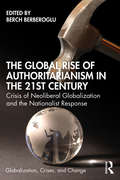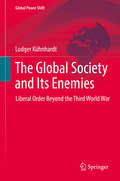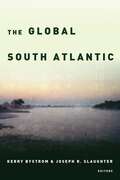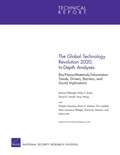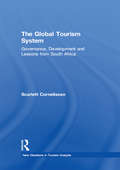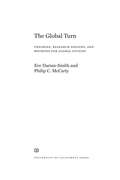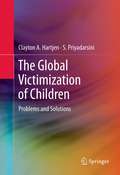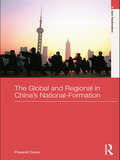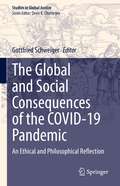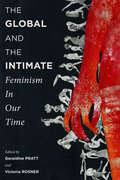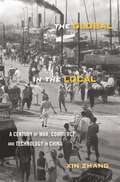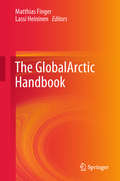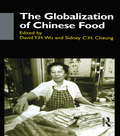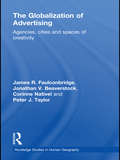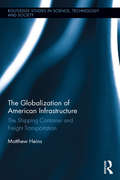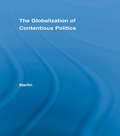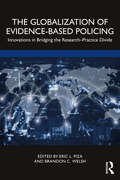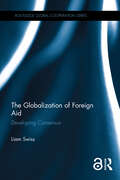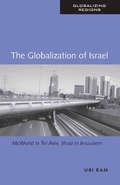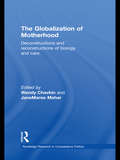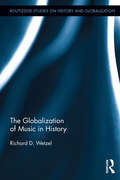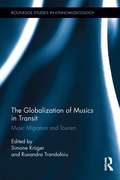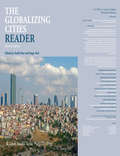- Table View
- List View
The Global Rise of Authoritarianism in the 21st Century: Crisis of Neoliberal Globalization and the Nationalist Response (Globalization, Crises, and Change)
by Berch BerberogluNeoliberal globalization is in deep crisis. This crisis is manifested on a global scale and embodies a number of fundamental contradictions, a central one of which is the global rise of authoritarianism and fascism. This emergent form of authoritarianism is a right-wing reaction to the problems generated by globalization supported and funded by some of the largest and most powerful corporations in their assault against social movements on the left to prevent the emergence of socialism against global capitalism. As the crisis of neoliberal global capitalism unfolds, and as we move to the brink of another economic crisis and the threat of war, global capitalism is once again resorting to authoritarianism and fascism to maintain its power. This book addresses this vital question in comparative-historical perspective and provides a series of case studies around the world that serve as a warning against the impending rise of fascism in the 21st century.
The Global Shelter Imaginary: Ikea Humanitarianism and Rightless Relief (Forerunners: Ideas First)
by Andrew Herscher Daniel Bertrand MonkExamines how the humanitarian order advances a message of moral triumph and care while abandoning the dispossessed Prompted by a growing number of refugees and other displaced people, intersections of design and humanitarianism are proliferating. From the IKEA Foundation&’s Better Shelter to Airbnb&’s Open Homes program, the consumer economy has engaged the global refugee crisis with seemingly new tactics that normalize an institutionally sanctioned politics of evasion. Exploring &“the global shelter imaginary,&” this book charts the ways shelter functions as a form of rightless relief that expels recognition of the rights of the displaced and advances political paradoxes of displacement itself.
The Global Society and Its Enemies: Liberal Order Beyond the Third World War (Global Power Shift)
by Ludger KühnhardtThis book discusses contemporary constellations of international politics and global transformation. It offers guidance on how to conceptualize the complexity of current global changes and practical policy advice in order to promote an open global society. In the light of today’s challenges, the author re-interprets the main argument of the philosopher Karl Popper in "The Open Society and Its Enemies". Based on this framework and new empirical evidence, the book discusses the thesis of an ongoing Third World War, triggered by fundamental deficits in nation-building, occurring primarily within states and not between them, and accelerated by asymmetric forms of warfare and Islamist totalitarianism.The book also explores various threats to the global order, such as the paradox of borders as barriers and bridges, the global effects of the youth bubble in many developing countries, and the misuse of religious interpretation for the use of political violence. Lastly, the author identifies advocates and supporters of a liberal, multilateral and open order and argues for a reinvention of the Western world to contribute to a revival of a liberal global order, based on mutual respect and joint leadership.
The Global South Atlantic
by Kerry Bystrom and Joseph R. SlaughterNot only were more African slaves transported to South America than to North, but overlapping imperialisms and shared resistance to them have linked Africa, Latin America, and the Caribbean for over five centuries. Yet despite the rise in transatlantic, oceanic, hemispheric, and regional studies, and even the growing interest in South-South connections, the South Atlantic has not yet emerged as a site that captures the attention it deserves.The Global South Atlantic traces literary exchanges and interlaced networks of communication and investment—financial, political, socio-cultural, libidinal—across and around the southern ocean. Bringing together scholars working in a range of languages, from Spanish to Arabic, the book shows the range of ways people, governments, political movements, social imaginaries, cultural artefacts, goods, and markets cross the South Atlantic, or sometimes fail to cross.As a region made up of multiple intersecting regions, and as a vision made up of complementary and competing visions, the South Atlantic can only be understood comparatively. Exploring the Atlantic as an effect of structures of power and knowledge that issue from the Global South as much as from Europe and North America, The Global South Atlantic helps to rebalance global literary studies by making visible a multi-textured South Atlantic system that is neither singular nor stable.
The Global Technology Revolution 2020, In-Depth Analyses: Bio/Nano/Materials/Information Trends, Drivers, Barriers, and Social Implications
by Natalie Gassman David R. Howell Philip S. Anton Anny Wong Richard SilberglittIn 2020, areas of particular importance for technology trends will include biotechnology, nanotechnology, materials technology, and information technology. This report, the companion document to The Global Technology Revolution 2020, Executive Summary (Silberglitt et al., MG-475-NIC, 2006), assesses in detail a sample of 29 countries with respect to their ability to acquire and implement 16 key technology applications.
The Global Tourism System: Governance, Development and Lessons from South Africa (New Directions in Tourism Analysis)
by Scarlett CornelissenFocusing on the political economy of the international tourism sector in the era of globalization and its impact in developing contexts, this book employs a case study analysis of South Africa to assess how international tourism as a global system of trade, production, exchange and governance plays out in developing countries. It also examines its benefits and disadvantages for these countries. Scarlett Cornelissen explores the nature and extent of global tourism production, consumption and regulation and how these bear upon developmental prospects, specifically in the South. She also highlights lessons for other developing countries about the limitations and possibilities for greater linkage to the global tourism system. The book is suitable for both scholars and practitioners interested in global tourism, international political economy, development, Africa and cultural studies.
The Global Turn: Theories, Research Designs, and Methods for Global Studies
by Eve Darian-Smith Philip C. MccartyThe ability to deploy interdisciplinary theoretical perspectives that speak to interconnected global dimensions is critical if one’s work is to be relevant and applicable to the emerging global-scale issues of our time. The Global Turn is a guide for students and scholars across all areas of the social sciences and humanities who wish to embark on global-studies research projects. The authors demonstrate how the global can be studied from a local perspective and vice versa. They show how global processes manifest at multiple levels—transnational, regional, national, and local—all of which are interconnected and mutually constitutive. This book takes readers through the steps of thinking like a global scholar in theoretical, methodological, and practical terms, and it explains the implications of global perspectives for research design.
The Global Victimization of Children
by Clayton A. Hartjen S. PriyadarsiniThis book describes the concept of child victimization in all its facets. Millions of young people throughout the world face violence, sexual, physical, and emotional abuse and exploitation on a daily basis. The worldwide victimization of young people can be prevented, or, at least, its incidence can be greatly reduced, if purposeful action is taken to do so. This volume researches and documents some of the ways in which young people throughout the world are victimized, and suggests strategies for preventing various forms of child vistimization. Eight distinct forms of victimization are identified and analyzed in detail. Included are discussions on child prostitution and pornography, economic exploitation through child labor and trafficking, physical and other abuse inflicted on young people in schools and other institutions, the use of children as armed combatants, and the denial of the basic needs and rights of children to such things as home and to education. In each chapter the authors discuss the nature of the victimization, its global dimensions and prevalence, and the measures governments and/or others are taking, or failing to take, to combat the harm based on the concept that youth victimization is a form of government crime.
The Global and Regional in China's Nation-Formation (Asia's Transformations/Critical Asian Scholarship)
by Prasenjit DuaraChina’s history tends to be studied from a national perspective only. The Global and Regional in China’s Nation-Formation attempts to train our eyes to see the picture of China less as a self-contained entity, a "geobody", than as part of a broader set of global and regional processes; from the "outside-in". It covers the major historical problems of China in the twentieth century, namely imperialism, nationalism, state-building, religion and the role of history Part I views imperialism and nationalism in China from the perspective of global and regional circulations and interactions. It also examines the changing role of history over the twentieth century from the same perspective. Part II focuses on how myth, religion and Chinese conceptions of society and polity are re-shaped by external influences and forces, as well as how these internal practices themselves shape the external impact. Part III is a comparative section, examining how global processes become unique developments in China. The Global and Regional in China’s Nation-Formation is an ideal resource for anyone studying China’s history, society and culture.
The Global and Social Consequences of the COVID-19 Pandemic: An Ethical and Philosophical Reflection (Studies in Global Justice #1212)
by Gottfried SchweigerThis book directly addresses the social and economic consequences of the COVID-19 pandemic. It does so by focusing on both the immediate effects during the pandemic and the lockdowns, as well as the issues related to the long-term social consequences that are likely to result from the economic crisis in the coming years. To date, most philosophical essays and books have focused on the health aspects of the pandemic, and in particular on the fields of medical ethics and public health ethics. Containing a truly international and interdisciplinary group of scholars, a unique and global perspective is offered on the rarely discussed social and economic consequences of the pandemic. This book is of great interest to academic philosophers, but also to researchers from the social sciences.
The Global and the Intimate: Feminism In Our Time
by Victoria Rosner Geraldine PrattSixteen essays by prominent feminist scholars and authors forge a distinctively feminist approach to questions of transnational relations, economic development, and intercultural exchange.
The Global and the Intimate: Feminism in Our Time (Gender and Culture Series)
by Geraldine Pratt Victoria Eds. RosnerBy placing the global and the intimate in near relation, sixteen essays by prominent feminist scholars and authors forge a distinctively feminist approach to questions of transnational relations, economic development, and intercultural exchange. This pairing enables personal modes of writing and engagement with globalization debates and forges a definition of justice keyed to the specificity of time, place, and feeling. Writing from multiple disciplinary and geographical perspectives, the contributors participate in a long-standing feminist tradition of upending spatial hierarchies and making theory out of the practices of everyday life.
The Global in the Local: A Century of War, Commerce, and Technology in China
by Xin ZhangThe story of globalization in the nineteenth and early twentieth centuries as experienced by ordinary people in the Chinese river town of Zhenjiang.Fear swept Zhenjiang as British soldiers gathered outside the city walls in the summer of 1842. Already suspicious of foreigners, locals had also heard of the suffering the British inflicted two months earlier, in Zhapu. A wave of suicides and mercy killings ensued: rather than leave their families to the invaders, hundreds of women killed themselves and their children or died at the hands of male family members. British observers decried an “Asian culture” of ritual suicide. In reality, the event was sui generis—a tragic result of colliding local and global forces in nineteenth-century China.Xin Zhang’s groundbreaking history examines the intense negotiations between local societies and global changes that created modern China. In the nineteenth and early twentieth centuries, world-historic political, economic, and technological developments transformed the textures of everyday life in places like Zhenjiang, a midsize river town in China’s prosperous Lower Yangzi region. Drawing on rare primary sources, including handwritten diaries and other personal writings, Zhang offers a ground-level view of globalization in the city. We see civilians coping with the traumatic international encounters of the Opium War; Zhenjiang brokers bankrolling Shanghai’s ascendance as a cosmopolitan commercial hub; and merchants shipping goods to market, for the first time, on steamships.Far from passive recipients, the Chinese leveraged, resisted, and made change for themselves. Indeed, The Global in the Local argues that globalization is inevitably refracted through local particularities.
The GlobalArctic Handbook
by Matthias Finger Lassi HeininenThis book offers a systematic and comprehensive introduction to the Arctic in the era of globalization, or as it is referred to here, the ‘GlobalArctic’. It provides an overview of the current status of the Arctic as a result of global change, while also considering the changes in the Arctic that have a global effect. It positions the Arctic within a broad international context, it addresses four main themes are discussed: economics and resources; environment and earth system dynamics; peoples and cultures; and geopolitics and governance. Gathering together expert authors and building on long-term research activities, it serves as a valuable reference for future research endeavors.
The Globalisation of Chinese Food (Anthropology of Asia)
by David Y. H. Wu Sidney C. H. CheungBy considering the practice of globalisation, these essays describe changes, variations and innovations to Chinese food in many parts of the world. The book reviews and broadens classic theories about ethnic and social identity formation through the examination of Chinese food, providing a powerful testimony to the impact of late 20th century globalisation.
The Globalization of Advertising: Agencies, Cities and Spaces of Creativity (Routledge Studies in Human Geography)
by Peter Taylor Corinne Nativel Jonathan Beaverstock James R. FaulconbridgeThe role of advertising in everyday life and as a major employer in post-industrial economies is intimately bound up with processes of contemporary globalization. At centre of the advertising industry are the global advertising agencies which have an important role in developing global brands both nationally and internationally. This book indentifies and addresses questions on the globalization of advertising through detailed study of the contemporary advertising industry in Detroit, Los Angeles and New York City and the way advertising work has changed in the three cities over recent years. The Globalization of Advertising draws upon previously unpublished research to unpack the contemporary structure, spatial organization and city geographies of global advertising agencies. The book demonstrates how teamwork in contemporary advertising agencies, intra-organizational power relations and the distribution of organizational capabilities all define how global agencies operate as transnationally integrated organizations. This in turn allows understanding to be developed of the role of the offices of global agencies located in the three case study cities, Detroit, Los Angeles and New York. The role of these three cities as preeminent markets for advertising in the USA is shown to have changed radically over recent years, experiencing both growth and decline in employment as a result of their position in global networks of advertising work; networks that operate in the context of a changing US economy and the rise of new and emerging centres of advertising in Asia and South America. This book offers a cutting edge overview of recent and current trends in the globalization of advertising and new insights into the way global advertising agencies operate in and through world cities. It will be a valuable resource for researchers and students studying Geography, Management and Sociology.
The Globalization of American Infrastructure: The Shipping Container and Freight Transportation (Routledge Studies in Science, Technology and Society)
by Matthew HeinsThis book gives an account of how the U.S. freight transportation system has been impacted and “globalized,” since the 1950s, by the presence of the shipping container. A globally standardized object, the container carries cargo moving in international trade, and it utilizes and fits within the existing transportation infrastructures of shipping, trucking and railroads. In this way it binds them together into a nearly seamless worldwide logistics network. This process occurs not only in ocean shipping and at ports, but also deep within national territories. In its dependence on existing infrastructural systems, though, the network of container movement as it pervades domestic space is shaped by the history and geography of the nation-state. This global network is not invariably imposed in a top-down manner—to a large degree, it is cobbled together out of national, regional and local systems. Heins describes this in the American context, examining the freight transportation infrastructures of railroads, trucking and inland waterways, and also the terminals where containers are transferred between train and truck. The book provides a detailed historical narrative, and is also theoretically informed by the contemporary literature on infrastructure and globalization.
The Globalization of Contentious Politics: The Amazonian Indigenous Rights Movement (Indigenous Peoples and Politics)
by Pamela MartinThis dissertation argues that Amazonian indigenous peoples organized via transnational networks due to the domestic blockages presented to them in their respective countires. Due to these blockages and the growing number of transnational political opportunity structures, such as national and international non-govermental organizations, multi-lateral development banks, and multinational corporation, indigenous peoples mobilized through transnational advocacy networks and eventually formed transnational social movement organizations. Through a comparative-historical analysis of five Ecuadorian Amazonian indigenous organizations, this work illustrates the processes of transnational collective action and its outcomes.
The Globalization of Evidence-Based Policing: Innovations in Bridging the Research-Practice Divide
by Eric L. PizaEvidence-based policing is based on the straightforward, but powerful, idea that crime prevention and crime control policy should be based on what works best in promoting public safety, as determined by the best available scientific evidence. Bringing together leading academics and practitioners, this book explores a wide range of case studies from around the world that best exemplify the integration of scientific evidence in contemporary policing processes. Chapters explore the transfer of scientific knowledge to the practice community, the role of officers in conducting police-led science, connection of work between police researchers and practitioners, and how evidence-based policing can be incorporated in daily police functions. The Globalization of Evidence-Based Policing is written for both researchers and practitioners interested in ensuring that scientific research is at center stage in policing. Agencies (including law enforcement agencies, research centers, and institutions of higher learning) can look to these case studies as road maps to better foster an evidence-based approach to crime prevention and crime control. Those already committed to evidence-based policing can look to these chapters to ensure that evidence-based policing is firmly institutionalized within their agencies. Accessible and compelling, this book is essential reading for all those interested in learning more about and doing more to bring about evidence-based policing.
The Globalization of Foreign Aid: Developing Consensus (ISSN)
by Liam SwissWhy do aid agencies from wealthy donor countries with diverse domestic political and economic contexts arrive at very similar positions on a wide array of aid policies and priorities? This book suggests that this homogenization of policy represents the effects of common processes of globalization manifest in the aid sector. Drawing on both quantitative and qualitative analysis of policy adoption, the book argues that we need to examine macro-level globalizing influences at the same time as understanding the micro-level social processes at work within aid agencies, in order to adequately explain the so-called ‘emerging global consensus’ that constitutes the globalization of aid.The book explores how global influences on aid agencies in Canada, Sweden, and the United States are mediated through micro-level processes. Using a mixed-methods approach, the book combines cross-national statistical analysis at the global level with two comparative case studies which look at the adoption of common policy priorities in the fields of gender and security. The Globalization of Foreign Aid will be useful to researchers of foreign aid, development, international relations and globalization, as well as to the aid policy community.The Open Access version of this book, available at http://www.taylorfrancis.com, has been made available under a Creative Commons Attribution-Non Commercial-No Derivatives (CC-BY) 4.0 license.
The Globalization of Israel: McWorld in Tel Aviv, Jihad in Jerusalem (Global Realities)
by Uri RamThis book focuses on how globalization is impacting contemporary Israel. It is a concise and originally argued introduction to Israel, but the author, Uri Ram, is careful to frame his analysis in a broader discussion of Israeli history and broader social currents. Focusing in particular on two defining – and conflicting – contemporary trends; one toward advanced liberal democracy with a cosmopolitan edge, and the other toward ethno-religious traditionalism and rejection of the secularism associated with market driven globalization. The cosmopolitan, high-tech driven city of Tel Aviv represents the former trend, and Jerusalem – a city increasingly dominated by orthodox Jews – represents the latter. Using Benjamin Barber's Jihad versus McWorld thesis to good effect, Ram's book will stand as an ideal introduction to contemporary Israel and its place in the world.
The Globalization of Motherhood: Deconstructions and reconstructions of biology and care (Routledge Research in Comparative Politics)
by Wendy ChavkinThe convergence of dramatic declines in birth rates worldwide, aside from sub-Saharan Africa, the rise of untrammelled global movement of capital, people and information, and the rapid-fire dissemination of a host of new medical technologies has led to the "globalization of motherhood". This book brings together research from the Global North and the Global South to illuminate how contemporary motherhood is being changed by the processes of globalization. It locates declining fertility and desire for motherhood in the context of female employment, the development of the global market in reproductive technologies, the rising transnational labour market demand for feminized carework, and changing family forms. Focusing on the impacts on women who mother- and enable others to do so- across diverse contexts, the book examines the way in which conception, gestation mothering labor and care are being mobilized across national boundaries. Bringing together demographers, sociologists, lawyers, public health and social theorists, this book will be of interest to students and scholars of globalization studies, development studies, gender studies, feminist politics, political economy, human rights, and social policy.
The Globalization of Music in History (Routledge Studies on History and Globalization)
by Richard WetzelThis book contextualizes a globalization process that has since ancient times involved the creation, use, and world-wide movement of song, instrumental music, musical drama, music with dance, concert, secular, popular and religious music. Integral to the process have been political, economic, military, and religious forces that motivated or compelled performers to travel, often far beyond the borders of their homelands, to practice their art and craft. That this music was often a traveling companion to non-musical movements—military campaigns, religious missions, political events –does not make the distance it traveled, nor its cultural and social impact, less remarkable. The Globalization of Music in History contributes to a growing awareness of the power of music to give insight into those things that all cultures and civilizations hold in common, and that promote and nurture mankind’s most noble virtues. The book adds a philosophical perspective to ongoing work in ethnomusicology, musicology, music therapy, and what may be an evolving global music. It attributes this evolution to the motivation by musicians to travel and to spread music around the globe, and even into outer space. It also provides connectivity between the people, activities and events in which music is used and the means by which it moves from one place to another.
The Globalization of Musics in Transit: Music Migration and Tourism (Routledge Studies in Ethnomusicology #4)
by Simone Krüger Ruxandra TrandafoiuThis book traces the particularities of music migration and tourism in different global settings, and provides current, even new perspectives for ethnomusicological research on globalizing musics in transit. The dual focus on tourism and migration is central to debates on globalization, and their examination—separately or combined—offers a useful lens on many key questions about where globalization is taking us: questions about identity and heritage, commoditization, historical and cultural representation, hybridity, authenticity and ownership, neoliberalism, inequality, diasporization, the relocation of allegiances, and more. Moreover, for the first time, these two key phenomena—tourism and migration—are studied conjointly, as well as interdisciplinary, in order to derive both parallels and contrasts. While taking diverse perspectives in embracing the contemporary musical landscape, the collection offers a range of research methods and theoretical approaches from ethnomusicology, anthropology, cultural geography, sociology, popular music studies, and media and communication. In so doing, Musics in Transit provides a rich exemplification of the ways that all forms of musical culture are becoming transnational under post-global conditions, sustained by both global markets and musics in transit, and to which both tourists and diasporic cosmopolitans make an important contribution.
The Globalizing Cities Reader (Routledge Urban Reader Series)
by Xuefei Ren Roger KeilThe newly revised Globalizing Cities Reader reflects how the geographies of theory have recently shifted away from the western vantage points from which much of the classic work in this field was developed. The expanded volume continues to make available many of the original and foundational works that underpin the research field, while expanding coverage to familiarize students with new theoretical and epistemological positions as well as emerging research foci and horizons. It contains 38 new chapters, including key writings on globalizing cities from leading thinkers such as John Friedmann, Michael Peter Smith, Saskia Sassen, Peter Taylor, Manuel Castells, Anthony King, Jennifer Robinson, Ananya Roy, and Fulong Wu. The new Reader reflects the fact that world and global city studies have evolved in exciting and wide-ranging ways, and the very notion of a distinct "global" class of cities has recently been called into question. The sections examine the foundations of the field and processes of urban restructuring and global city formation. A large number of new entries focus on the emerging urban worlds of Asia, Latin America and Africa, including Beijing, Bogota, Cairo, Cape Town, Delhi, Istanbul, Medellin, Mumbai, Phnom Penh, Rio de Janeiro, Sao Paulo, and Shanghai. The book also presents cases off the conventional map of global cities research, such as smaller cities and less known urban regions that are undergoing processes of globalization. The book is a key resource for students and scholars alike who seek an accessible compendium of the intellectual foundations of global urban studies as well as an overview of the emergent patterns of early 21st century urbanization and associated sociopolitical contestation around the world.
